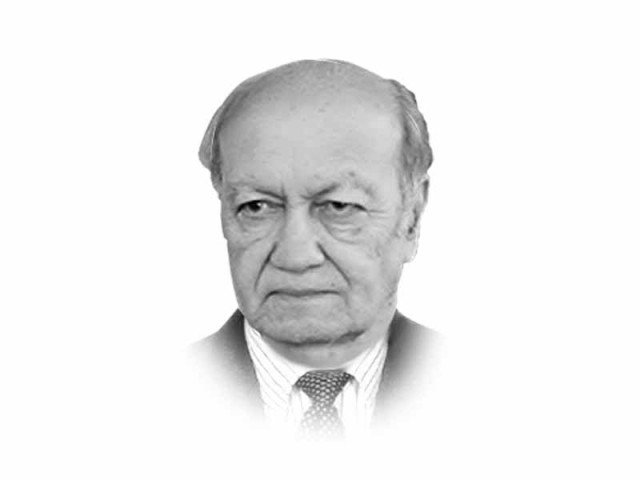Ferment in the Arab World
Muslim countries fail to realise that by destabilising one another, they are further aggravating their insecurities.

The writer is a retired lieutenant general of the Pakistan Army and served as chairman of the Pakistan Ordnance Factories Board
The tussle between Saudi Arabia and Iran has sharply polarised the Middle East. Iran is fully backing the Assad regime and Saudis are supporting the insurgent groups. Besides the sectarian underpinnings of this conflict, it is also a power struggle between Iran and Saudi Arabia for enhancing their influence in the region. Meanwhile, in Syria, internecine fighting between rebel groups and affiliates of al Qaeda is also taking place in which al Qaeda seems to be gaining an upper hand.
A similar pattern of proxy war is taking place in Iraq, with Iran supporting the government of Prime Minister Nouri al Maliki and Saudis lined up with the rebels. Saudis are funding the opposition and Iran is giving diplomatic and financial support to Maliki’s regime.
The spiralling chaos in Iraq has drawn militants from all over the Middle East and even South and Central Asia. The metastasising problem of radicalisation in most Muslim countries and especially in Iraq, Syria and Lebanon is becoming another major battleground of the sectarian struggle.
It is believed that Iran has influenced Maliki’s Iraqi regime through its covert support to an extent that it has alienated some in the Sunni community towards joining extremist groups and seeking help from Saudi Arabia and the UAE.
The Saudi policy of countering Iran is also dictated by its profound concern that if it develops a nuclear capability or if a nuclear deal with Iran comes through, it will be a prelude to it becoming a dominant power in the Middle East. Moreover, Saudis are concerned that the US has disengaged from Iraq, is half-hearted in overthrowing Assad and is moving towards a permanent nuclear deal with Iran, which leaves them in a quandary.
Sectarian and geopolitical factors are also fueling conflict and sectarian divide in Lebanon, Yemen and Afghanistan, and even in Pakistan.
Muslim countries are exploiting one another’s weaknesses. Assad’s authoritarian and cruel regime is fertile territory for meddling. The US and other Western countries, along with the Saudis, are running guns to all types of groups that are resisting the Assad regime. On the other hand, the Iranians and Russians are supplying arms to Syria to fight the insurgents.
In Iraq, Prime Minister Maliki’s extremely parochial and discriminating attitude against certain sections of the population is causing deep resentment among the persecuted communities.
The irony is that rulers of Muslim countries exploiting the weaknesses of their external or domestic adversaries are equally vulnerable.
Already, we are witnessing jihadis in Syria forming a nexus with the Salafis in Lebanon, thereby widening the conflict. It is not surprising that al Qaeda affiliates are moving into Lebanon, Syria and Iraq.
The paradox is that Saudis are unwilling to send any of their own citizens to join the jihad in Syria or Iraq, but are the main backers of it. They are spending money, giving arms and encouraging other countries to send their jihad contingents to participate in the conflict. How far and for how long can they insulate themselves from the conflict? It is only a matter of time that the flames of fire they have initiated would engulf them. Experience has shown that it is well nigh impossible to exercise control over these militias once they have tasted power and autonomy.
There have been reports that during his recent visit to Pakistan, the Saudi foreign minister, among other matters, sought support of our government for sending jihadi volunteers from Pakistan to Syria and other destinations. We only hope this is not true because we cannot afford the same mistake we made in the 1980s of volunteering to send jihadis to fight in Afghanistan. Our helplessness and begging bowl mentality made us willingly accept this dangerous course. We soon found out that once back from their mission, mercenary soldiers or ideologically committed groups redirect their radical energies on the home front.
The other very troubling issue is the record of Muslim countries in dealing with their minorities. Egyptians are mistreating the Coptic; the Saudi record of dealing with Shias is highly disappointing. The Iranians are no better. They have ruthlessly suppressed and mistreated their minorities. Pakistan’s record of its treatment of minorities is quite shameful and in sharp contrast to Jinnah’s vision.
Unless there is sectarian and religious peace within Muslim countries and non-interference between them, peace and stability will remain a mirage. Proxy wars are destabilising the countries, sharping the sectarian fault lines and creating space and scope for gross interference by the US and other major powers in their internal affairs.
The use of proxies is a manifestation of the insecurities that the Muslim countries are suffering. What they fail to realise is that by destabilising one another, they are further aggravating their insecurities.
It is a matter of shame that Muslims today are one of the least educated and backward people, despite the enormous resources they are endowed with. The leaders of these countries need to broaden their vision, compete with one another to excel in the pursuit of education, science, technology and good governance, instead of engaging in sectarian and ethnic conflicts and regional power play. They should also draw lesson from the Catholic-Protestant conflict that lasted several centuries and spilled blood across Europe without anything to show for it except death, destruction and misery.
Published in The Express Tribune, January 20th, 2014.
Like Opinion & Editorial on Facebook, follow @ETOpEd on Twitter to receive all updates on all our daily pieces.















COMMENTS
Comments are moderated and generally will be posted if they are on-topic and not abusive.
For more information, please see our Comments FAQ